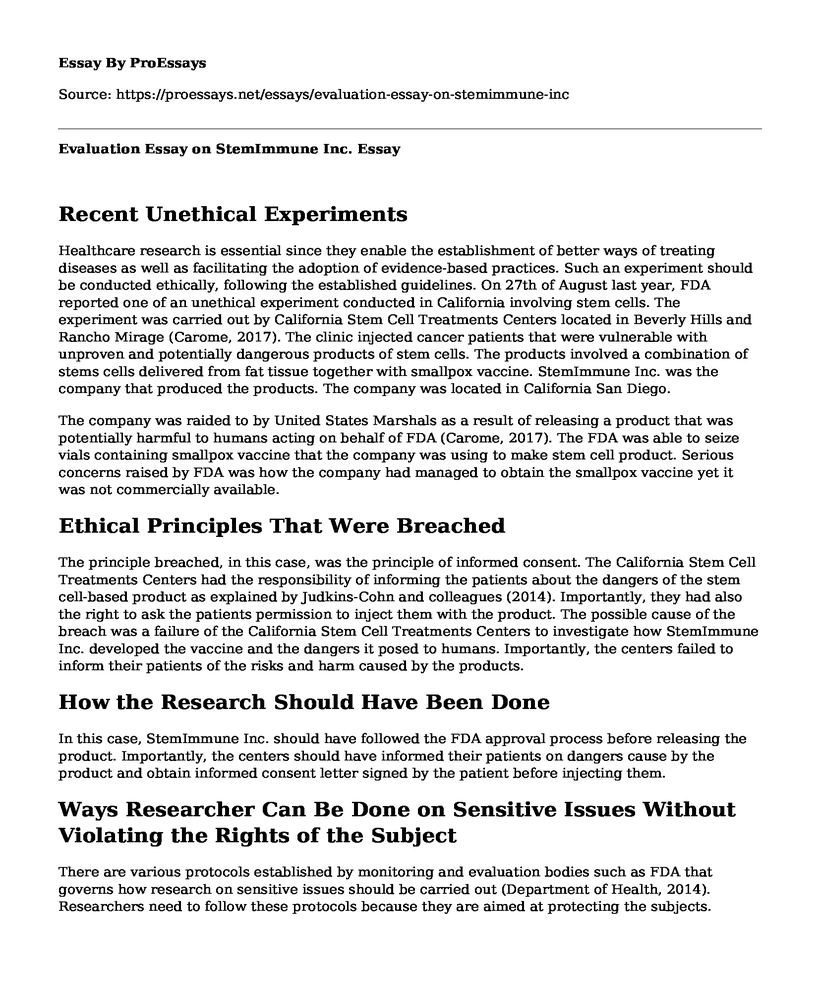Recent Unethical Experiments
Healthcare research is essential since they enable the establishment of better ways of treating diseases as well as facilitating the adoption of evidence-based practices. Such an experiment should be conducted ethically, following the established guidelines. On 27th of August last year, FDA reported one of an unethical experiment conducted in California involving stem cells. The experiment was carried out by California Stem Cell Treatments Centers located in Beverly Hills and Rancho Mirage (Carome, 2017). The clinic injected cancer patients that were vulnerable with unproven and potentially dangerous products of stem cells. The products involved a combination of stems cells delivered from fat tissue together with smallpox vaccine. StemImmune Inc. was the company that produced the products. The company was located in California San Diego.
The company was raided to by United States Marshals as a result of releasing a product that was potentially harmful to humans acting on behalf of FDA (Carome, 2017). The FDA was able to seize vials containing smallpox vaccine that the company was using to make stem cell product. Serious concerns raised by FDA was how the company had managed to obtain the smallpox vaccine yet it was not commercially available.
Ethical Principles That Were Breached
The principle breached, in this case, was the principle of informed consent. The California Stem Cell Treatments Centers had the responsibility of informing the patients about the dangers of the stem cell-based product as explained by Judkins-Cohn and colleagues (2014). Importantly, they had also the right to ask the patients permission to inject them with the product. The possible cause of the breach was a failure of the California Stem Cell Treatments Centers to investigate how StemImmune Inc. developed the vaccine and the dangers it posed to humans. Importantly, the centers failed to inform their patients of the risks and harm caused by the products.
How the Research Should Have Been Done
In this case, StemImmune Inc. should have followed the FDA approval process before releasing the product. Importantly, the centers should have informed their patients on dangers cause by the product and obtain informed consent letter signed by the patient before injecting them.
Ways Researcher Can Be Done on Sensitive Issues Without Violating the Rights of the Subject
There are various protocols established by monitoring and evaluation bodies such as FDA that governs how research on sensitive issues should be carried out (Department of Health, 2014). Researchers need to follow these protocols because they are aimed at protecting the subjects.
References
Carome, M. (2017, October). Outrage of the Month: Illegal Stem Cell Treatments Endanger Vulnerable Patients | Public Citizen. Retrieved from https://www.citizen.org/our-work/health-and-safety/outrage-month-illegal-stem-cell-treatments-endanger-vulnerable-patients
Department of Health, E. (2014). The Belmont Report. Ethical principles and guidelines for the protection of human subjects of research. The Journal of the American College of Dentists, 81(3), 4.
Judkins-Cohn, T. M., Kielwasser-Withrow, K., Owen, M., & Ward, J. (2014). Ethical principles of informed consent: Exploring nurses' dual role of care provider and researcher. The Journal of Continuing Education in Nursing.
Cite this page
Evaluation Essay on StemImmune Inc.. (2022, Aug 10). Retrieved from https://proessays.net/essays/evaluation-essay-on-stemimmune-inc
If you are the original author of this essay and no longer wish to have it published on the ProEssays website, please click below to request its removal:
- Chinese Entrepreneurship and Innovation Essay Example
- Essay Sample on Walmart's Compensation Program
- Business Knowledge Management Paper Example
- Accounting Fraud at WolrdCom Case Study Paper Example
- Nike's Rise: From US Company to Global Phenomenon - Essay Sample
- 3 Recruiting Methods to Select Quality Hotel Manager Applicants - Essay Sample
- Essay Example on Consumer Protection: Safeguarding Public from Unfair Practices







